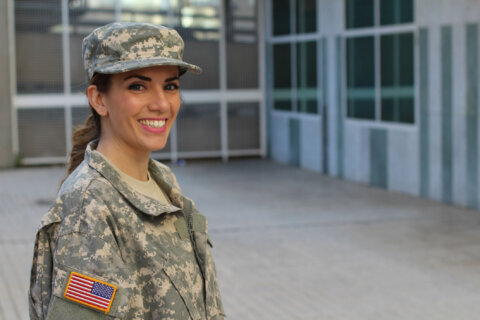This content is sponsored by American Military University.
Alise Faircloth, an ambitious U.S. Army veteran from Connecticut, had one of the most intense careers in the military one could imagine, serving as a combat medic who worked to save lives in the field.
“It really puts in front of you what you’re capable of,” Faircloth said, describing her experience in the Army.
Faircloth served from 2007 to 2015, deployed overseas two times and worked her way up through the ranks to become a staff sergeant.
“They consistently push you with the intent of showing you what you can do so when things get hard, you still have enough grit to make things happen,” Faircloth said. “It just built up that confidence to know that you can always pull through.”
Faircloth was no stranger to the military.
Her father served in the Army and her grandfather served in the Navy, so when she made the decision to get involved herself, she enthusiastically jumped in with both feet.
“For the most part I was just excited for the new chapter,” Faircloth explained. “I was just ready for a change of pace and anxiously happy to face that new adventure.”
Thriving in training
Faircloth acknowledged that she was “a little bit intimidated” when she first went to basic training because “what you hear about it is intense.”
That didn’t last long.
The self-determined Faircloth thrived, became a leader among her peers and excelled with medical training that would ultimately shape her military career.
Out of everything Faircloth learned, the collaboration and teamwork she experienced influenced her the most.
“If the military teaches you anything, it teaches you how to work with people,” Faircloth said. “The skills that it gives you to work through things with others are unmatched.”
After earning the role of combat medic, Faircloth deployed to Kuwait and Afghanistan, and something happened overseas that would change her life forever.
The attack
It was June 1, 2012 in southeastern Afghanistan when the base Faircloth was stationed at was attacked.
As reported by The Washington Post, “insurgents pounded the base with a truck bomb, killing two Americans and seriously wounding about three dozen troops.”
Five Afghan civilians were killed and more than 100 other U.S. troops were treated for minor injuries.
“I wasn’t physically hurt so I was able to run to our hospital, hop on a trauma bed and start working on patients who were being rushed in,” said Faircloth.
She knew many of those patients personally and considered them to be friends.
“Something that big and that close brings you to the reality of how short life is,” Faircloth said.
Her mindset has never been the same.
“For me, the focus has been shifted on just living and being a good person because that’s the legacy that you leave behind,” Faircloth said.
Degrees from AMU
Faircloth felt weighed down by student loan debt that she accumulated while attending traditional colleges prior to her military career.
It was one of the factors that initially sparked her interest in the Army.
“When I started to see the loans stacked up for college I looked to the military as a way to not only serve my country but also to pay for education,” Faircloth explained.
That is why it was such a relief for her when she became a student at American Military University which she described as a “night and day” difference compared to the cost burden she faced with her previous schools.
“With AMU I didn’t have to worry,” Faircloth said, noting she used her military education benefits and technology fees are waived for service members.
Faircloth received a bachelor’s degree in public health and a master’s degree in management from AMU, taking flexible, online courses that allowed her to achieve her academic goals while simultaneously carrying out her military duties even when she was in remote locations with spotty internet service.
“I needed to know that the school that I was going to was supportive and could help me work around situations like that,” Faircloth said.
Faircloth currently works at a tech company in “people operations,” serving as a mentor to others and focusing on employee development, engagement and retention.
Just like during her military career, Faircloth enjoys collaborating with her colleagues and working as a team.
However, she finds it challenging at times to move past the rigorous, high-pressure lifestyle she had for all those years.
“It’s definitely a struggle,” Faircloth said. “It is a change of pace and something that takes a lot of adjusting to get used to.”







